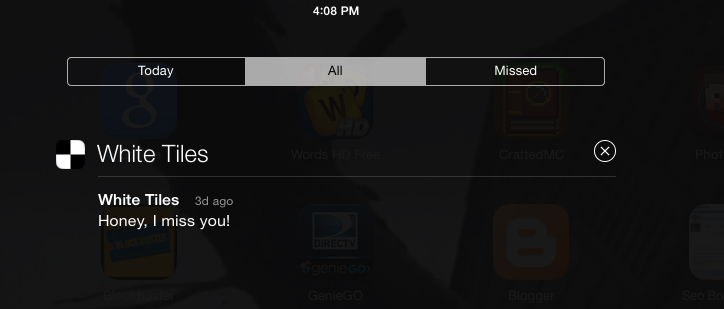This post has not been edited by the GamesBeat staff. Opinions by GamesBeat community writers do not necessarily reflect those of the staff.
 I barely need to pick up my iPhone or iPad devices to remember the kinds of push alerts that certain games like White Tiles 4 intriguingly load into my notifications screen, trying to entice me to play.
I barely need to pick up my iPhone or iPad devices to remember the kinds of push alerts that certain games like White Tiles 4 intriguingly load into my notifications screen, trying to entice me to play.
“Honey, I miss you!”
Wow. Viewing a notification like that with a side-eyed view, I find myself almost wanting to hide it from my husband so he won’t misconstrue the fact that it is a game trying to win me over, not another man. Alas, I’ve got to give it to that Brighthouse developer. That’s one of the most interesting push alert notifications attempting to get a user to come and play a game that I’ve seen in quite a long time. That’s in no small part due to the fact that I tend to immediately turn off all gaming app push alert notifications soon after the game is downloaded onto one of my devices. (I just turned off White Tiles 4 notifications, too, a game I’d missed performing that ritual for until today.)
Would broadcast messages be more effective for game users?
The fact that I turn off gaming notifications leads me to believe many other users are doing the same thing. After all, folks these days get enough beeps and reminders from emails, phone calls, text messages and voicemails. We don’t necessary need a game screaming at us to come engage in another round of Flow Free or Scribblenauts.
Turning off push alert notifications means that game developers must think of more creative ways to engage users that other companies haven’t considered. I’m talking about reaching users in ways well beyond the level of creative copywriting that White Tiles 4 uses. (Good on you, though, Brighthouse writers.)
What if – and bear with me here – gaming companies totally jumped the shark and began taking advantage of using broadcast messages to send bulk messages to the recipients that have opted into such a feature via the game?
For example, each time the pastor of my former church or the administration of my children’s schools wants to pass on some announcement, they do so by calling the landline and cell phone numbers I’ve provided them for such a purpose.
Of course, simply downloading a gaming app shouldn’t give companies carte blanche to call the users’ phones. Heck, remember how pissed off some folks were because those emergency alerts woke them up at 3 a.m. blaring loudly on their cell phones? However, gaming companies could offer their users incentives to opt in to receiving broadcast messages – such as extra points, or whatever – and then hire a company to take care of the behind-the-scenes work.
I could only imagine the types of cartoonish-sounding voices that could accompany those calls – and the kinds of scripts they’d need to follow to encourage gamers to fire back up that app and begin playing once more. Wacky and wild, yes, but with so many gaming apps littering the iTunes App Store and the Google Play Store, firms are going to have to try all manner of marketing methods to encourage their users not to delete their gaming apps only to move on to their competitors.
